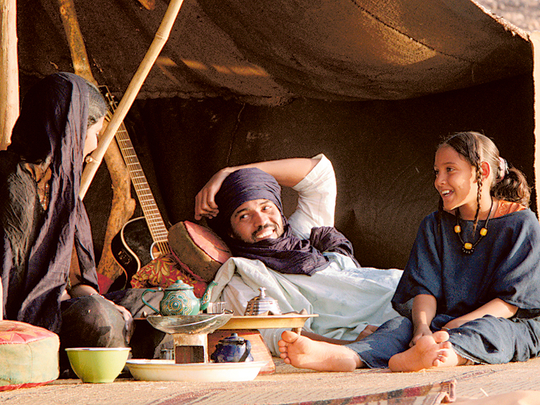
The African film Timbuktu begins with an antelope racing to escape hunters and ends with a young girl similarly on the run. Both animal and child are, by implication, Mali itself, a country struggling to survive the repression of its culture by militants.
This extraordinary film by the Mauritanian director Abderrahmane Sissako premiered a year ago in Cannes, but has gone on to become, if anything, more timely and urgent. This month’s report of video footage showing amputations and stonings by Boko Haram in Nigeria, as well as the continuing destruction of historic sites in Iraq — it all echoes through Sissako’s film.
It has a free screening at the Alliance Francaise in Dubai on June 9 at 8pm.
Timbuktu is a cri de coeur against violence and intolerance, but what makes it so unusually compelling as a protest film is that it’s also a richly poetic work of cinema — witty, beautiful and even, sobering though it is, highly entertaining.
Mischievous and imaginative, Timbuktu avoids the worthiness and emotional manipulation of so much current affairs cinema. The film is a panorama that constantly slips between stories and characters, building up its effect elliptically, all the better to hit us in the end with the full weight of its message. We know at the start what’s at stake as we watch a line of traditional carved statues shot to pieces. Shortly after, militant police walk through the ancient city of Timbuktu making announcements through megaphones; they seem a little hesitant, which makes their new directives seem all the more arbitrary. A man is told that his trousers are improperly long and ordered to roll them up. Women must wear socks and gloves at all times, causing a market trader to protest furiously: how is she supposed to handle fish if she has gloves on?
Militia commander Abdelkerim (Abel Jafri) is himself a contradictory figure, enforcing a draconian law, but ostensibly coming across as a mild-mannered, long-suffering type, taking sneaky puffs of cigarette on the quiet. He’s seen wearily trying to direct a nervous youth, an ex-rapper, in a militant video that’s not quite working: “No ‘Yo, man’ — we’re into religion now.” For all the horror, the militants are humanised, demystified; they can’t always carry off the performance as convincingly as they’d like.
Militants chat in the street about Zidane and Messi, but football is banned. A delicious set piece shows men and boys playing the ultimate form of fantasy football — a match with no ball. It’s comedy, but it’s also their means of protest; it comes just after a man has been sentenced to flogging for playing the sport.
One of the most appalling aspects of the militants’ campaign in Mali is the suppression of music, of a tradition that in recent years has given us countless world-class artists, including singer-songwriters Rokia Traore (a Cannes jury member this year) and Fatoumata Diawara, who plays a small but telling role in Timbuktu. Voices and strings are heard drifting over the streets: “They’re singing praise to the Lord and his prophet,” a soldier tells his officer. “Should I arrest them?”
Diawara plays a woman who sings in a beautiful, leisurely domestic session with friends; as a result, she’s given 80 lashes. When the punishment is administered, the woman’s response is harrowing but magnificent; she emits a wail that is at once a cry of pain and a soaring chant of revolt. It’s one of two extremely violent moments in the film, both depicted with a merciful delicacy that only increases their impact.
The militants’ hostility is especially directed at women. Visiting Satima (Toulou Kiki), the wife of Tawareq herder Kidane (Ebrahim Ahmad), Abdelkerim berates her for having her hair uncovered, but she’s in the middle of washing it and no one would have been present to see her if Abdelkerim hadn’t driven out into the desert specifically to pester her. In the film’s most overtly absurdist image, Abdelkerim uses his gun to mow down a tuft of grass between two sand dunes, apparently offended by its resemblance to a pubic mound. Meanwhile, contemptuous female defiance comes in the form of the stately Zabou (Kettly Noel), possibly enchantress, possibly madwoman, who parades through the film in a long, trailing robe, satirical eyebrow always raised.
The film’s emotional centre is the story of Satima’s family and their run-in with a belligerent fisherman; it all comes to the boil distressingly, but affords some tender, relaxed ensemble acting. It’s also the part of the film most likely to leave you with a lump in your throat.
A work of intense anger and compassion, Timbuktu is a lesson in how powerful a work of screen polemic can be when executed with the full palette of artistic subtlety, including Sofiane Al Fani’s widescreen photography, which counters the starkness of militant ideology with the warmth of desert light on buildings, dunes and faces. There may be little that’s cheering in the conditions depicted, yet Sissako’s film revels in the joy of people, of music and of film, making Timbuktu a formidable statement of resistance in itself.









